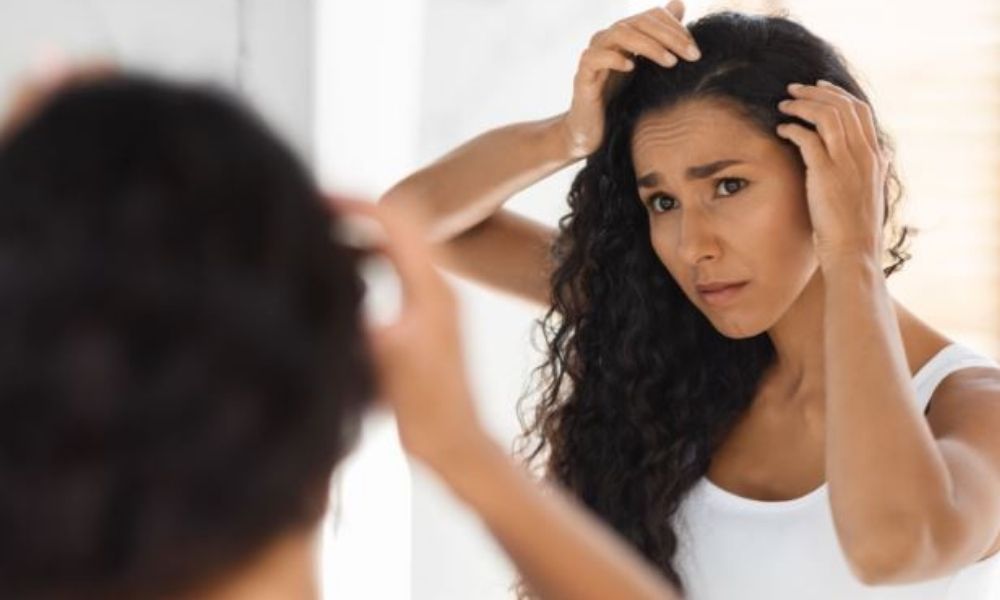Dandruff: Causes, Treatments, and How to Prevent

There’s nothing more aggravating than scratching your head on a normal day and finding little white specks of dandruff falling off your hair. It ruins a good outfit and keeps you conscious all day long. What is the right way of dealing with this?
To effectively treat dandruff, you must first know its causes, triggers, and what exactly it is. The reason it’s not going away is probably because you’ve been mistaking it for something else or doing more or less than you need to. This article will give you every bit of information you need about dandruff and the right personal care routine to help you get rid of it once and for all.
What is Dandruff?
According to WebMD, Dandruff is a skin condition that causes white or yellow skin flakes on the scalp. It can be itchy and spread to your hairline, eyebrows, and behind your ears. These flakes are actually dead skin cells that shed.
Dandruff is a milder form of seborrheic dermatitis, a common skin condition that causes itchy patches and greasy scales on the skin where you have a lot of oil (also called sebaceous glands), including the scalp.
What Causes Dandruff?
Contrary to how it seems and all the flaky thing going on, dandruff is not caused by a dry scalp. In fact, it’s the opposite.
Dandruff is caused by excessive oil production and yeast growth in the scalp.
Due to the excessive oil in your scalp, your skin tries to compensate with an overgrowth of a type of yeast or fungus called Malassezia. All people have this type of yeast on their skin; it's one of the many microbes that live in or on the human body. They're part of your body's microbiome.
This Malassezia feeds off the oil your skin makes and helps keep other microbes on your skin in balance. But when there are too many, it can start a cycle of irritation instead — leading to the itching and flaking of dandruff. This explains why you shed dead skin cells and suffer from dandruff.
That is just one, if not the main cause of dandruff. According to the American Academy of Dermatology, an associated or potential cause may also include sensitivity to substances, such as hair products.
In any case you presume the cause of your dandruff is other than an oily scalp, make sure to consult a professional.
Dandruff vs. Dry Scalp
How do I know if I have dandruff or dry scalp? The difference between the two is pretty subtle, and only you can know it.
Flaky fallouts caused by dandruff are bigger compared to those caused by dry scalp. They may have a yellow tint and feel oily when you touch them; dry scalp flakes on the other hand are much smaller, whiter, and do not give a feeling of moisture.
Apart from these, it will also feel different upon scratching your scalp. You should immediately know if it's dry or oily. Treating dry scalp should succeed after less frequent use of shampoo on your hair.
How to Get Rid of Dandruff
There are many hair products available on the market made especially for treating dandruff, but knowing which one to use can be confusing especially if they all claim to be the best dandruff shampoo on the market.
Finding the right dandruff shampoo all depends on your hair’s needs and the seriousness of your skin condition.
Best Dandruff Shampoo
When looking for a shampoo for dandruff treatment, it’s important to look into the list of ingredients and find selenium sulfide for it is the anti-infective agent proven to treat dandruff, itching, and flaking effectively.
Derived from its name, Selsun Blue is a globally popular anti-dandruff shampoo with selenium sulfide as its main active ingredient. You can buy its products from Hypha on Iskaparate.com!
For dry and damaged hair, use a moisturizing anti-dandruff shampoo for superior moisturization for soft and manageable hair and contains natural French honey extract to restore hair and hydrate the scalp.
For normal hair, use 2-in-1 anti-dandruff shampoo and conditioner for a perfectly balanced clean, healthy, anzd hydrated hair free of dandruff.
For persistent dandruff on an itchy scalp, use Selsun Blue Pro-X Extra Strength Anti-dandruff Shampoo. It’s a strong anti-dandruff shampoo with added menthol to soothe itchy scalp.
Home Remedies for Dandruff
Now home remedies aren’t the best thing for actually “treating” dandruff. They can relieve or temporarily heal, but they won’t be as reliable or effective as using shampoo that’s been under a meticulous process to ensure effectiveness.
But if you believe your dandruff is too mild to use shampoo or other medications and think home remedies will suffice. The following popular remedies might help.
1. Coconut Oil
According to a medically reviewed article on Very Well Health, coconut oil maintains and boosts the bacteria and fungi that keep it healthy. It also helps reduce pain and inflammation which help reduce the discomfort of itching that comes with the skin condition.
Most of all, as coconut oil is most known for, it effectively provides moisture and prevents moisture loss. The presence of fatty acids also helps fight off irritation and flaking, while its lauric acid content provides microbial balance properties that help rebalance the scalp's microbiome.
To use, scoop out 1 to 2 tablespoons of coconut oil, massage on the scalp, and let it sit for 30 minutes to an hour. After, rinse and gently shampoo, and then comb from the scalp to the hair tips to make sure all flakes are removed.
2. Aloe Vera Gel
Aloe vera is a succulent plant popular for its wide-range healing properties. The gel in its leaves contains several various amino acids and antioxidants. Simply no wonder it's a versatile product that can be used on the face, skin, hair, and more!
According to a 2019 study that examined 23 clinical trials, aloe vera gel may improve moisture retention in the skin and promote wound healing. Aloe vera may also reduce inflammation, which can help people with dandruff symptoms, such as itchiness.
It has also been discovered to possess antifungal and antibacterial properties which are important for treating and preventing dandruff.
To use, simply scrape off the gel from the aloe vera plant and massage it on your scalp. Leave it for 30 minutes to an hour and rinse off.
3. Baking Soda
Baking soda is one of those products that you never find missing in your kitchen. It’s easily accessible, affordable, and can be used for practically anything — even getting rid of your hair’s dandruff.
According to Healthline, there really is no strong proof that baking soda can be a treatment for dandruff. However, it’s been proven to contain antifungal properties which are one of the most necessary ingredients for relieving dandruff.
May it be due to the mentioned properties or not, baking soda is a popular remedy for reducing itchiness and irritation on the scalp. It can remove buildup and get rid of excess moisture by drying it out.
However, using this long-term can cause harm instead due to its high pH level, especially compared to the scalp and hair shafts. As a result, your hair can turn out dry, frizzy, or basically damaged.
There are two ways of using baking soda on the scalp for dandruff treatment. You can apply it directly on your scalp or mix a tablespoon to two cups of water to turn it into a cloudy consistency. Massage for a minute or two and then rinse.
How to Prevent Dandruff
You might have tried every anti-dandruff shampoo or remedy out there and still find yourself asking, “Why does my dandruff keep coming back?”
According to an article by the University of Australia, your dandruff is most likely coming back because the treatment you used did not reach the right spot or you simply did not treat it for a sufficient amount of time for it to heal.
Another reason could be is that oil is once again accumulating on your scalp and you aren’t shampooing enough to balance it out. If you have arrived to this conclusion and resort to frequent shampooing instead, be minded that even too frequent shampooing may lead to dry scalp and cause flaking as well. Make sure to create just the right routine for healthy hair and scalp.
The best way to prevent dandruff from coming back is to regularly use anti-dandruff shampoo that is a fitting variant to your condition. The mentioned shampoo variants above perfectly explain which one you need. Add this to your routine and find no more stubborn flakes falling off your hair!


